Countries
Solidarity campaigns
Turkmen Get By on Piecemeal Sales and Cash Withdrawals in Uzbekistan

Turkmen shuttle traders constantly face problems. The border with Kazakhstan remains closed to residents of the adjacent Balkan region, even if they have a visa. Local customs officials at Istanbul airport enthusiastically check passengers from Turkmen flights and confiscate any excess quantities of spirits, as Turkmen vodka is in high demand there. The Uzbek authorities, meanwhile, have imposed limits on the volume of imported goods — no more than two kilograms of any product with an overall weight not exceeding 10 kg.
The latter restrictions have hit the residents of Lebap region especially hard, as they used to make a decent return reselling Turkmen goods in neighboring Uzbekistan. But even now, despite all the limits, people are still travelling to Uzbekistan to sell everyday goods and withdraw cash from ATMs. Turkmen.news correspondent Oguljan Tahirova went to Uzbekistan to find out how Turkmen are making ends meet there. Here is her photo report.
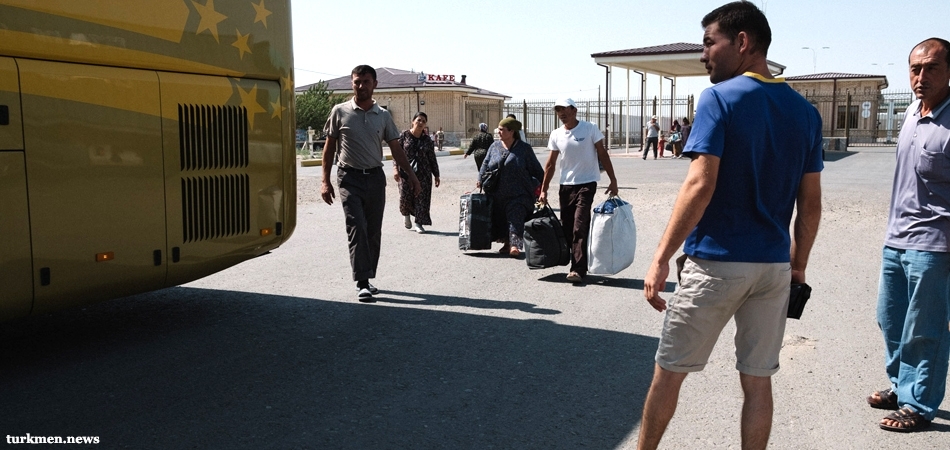 Farap checkpoint at Turkmen-Uzbek border (slide photos to view more)
Farap checkpoint at Turkmen-Uzbek border (slide photos to view more)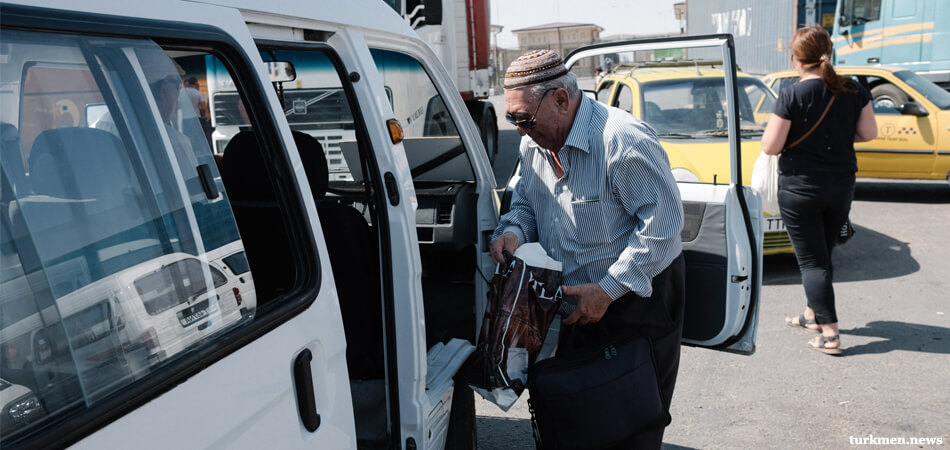 Farap checkpoint at Turkmen-Uzbek border
Farap checkpoint at Turkmen-Uzbek border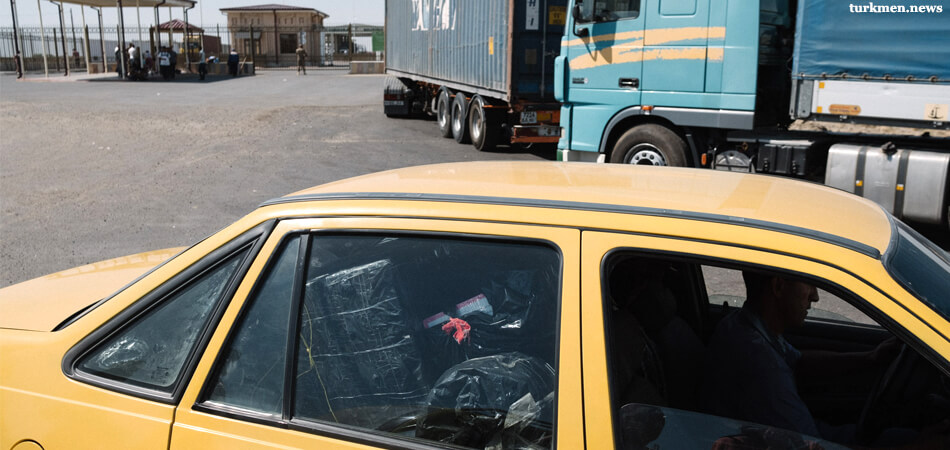 Farap checkpoint at Turkmen-Uzbek border
Farap checkpoint at Turkmen-Uzbek border
Farap checkpoint at Turkmen-Uzbek border
Uzbek visas in demand
In 2013 the Turkmenistan authorities deprived residents of Lebap and Dashoguz of the opportunity to visit Uzbekistan’s border districts for up to three days without a visa. This decision had a negative effect on both the volume of trade and the number of visits both ways. Since then a visa has been required to cross the border.
Numerous Turkmen tourism companies have found their niche in this situation. While they used to have little to do, serving occasional foreigners or rich Turkmen who wanted to visit Dubai or Thailand, now they have no end of customers. They do all the paperwork to obtain an Uzbek visa for 850 manats (around $47, card payment is accepted). Consular services cost $71; payment has to be made at a bank and in manats, and the receipt has to be shown to the tourism company. The visa is valid for one month and allows two trips to the country.
It now takes 20 days to get a visa, while less than a year ago it took just 10 days, a sign of the increase in numbers wanting to visit Uzbekistan.
One bottle of shampoo, three packets of tissues, four bars of soap
It’s about an hour’s journey from Turkmenabat to the town of Alat in Bukhara region, not including the time taken to cross the border. If there aren’t any problems at customs, people who reached the border in the morning are already getting into buses and minibuses on the Uzbek side by midday. Our driver, Yashnar, says that he takes around 80 people a day from the border to Alat and back.
“I used to take far more when there weren’t any visas,” he says. “I don’t understand why they have to make life more difficult for ordinary citizens — at least let them visit one another. We’re peaceful people.” Like many in Uzbekistan’s Bukhara region, Yashnar has distant relatives in Turkmenistan.
It doesn’t take long to cross the border on either side, but at customs they find fault with everything, even with salami in the luggage.
“If you say you’re taking it for your own consumption on the journey, they ask why you haven’t sliced it,” one of the fellow passengers from Farap tells me. She is taking five boxes of salami, all to sell, but she is sure she won’t have any problems, hinting that it’s all been arranged at customs.
The Uzbeks carefully check everything too. On their side of the border there are even separate cubicles for body searches of men and women; they’re looking for banned goods hidden in private places, hard currency and gold, but while I was there, nobody was given a body search; only their luggage and personal items were checked. A while later we get the coveted stamps in our passports and we’re in Uzbekistan.
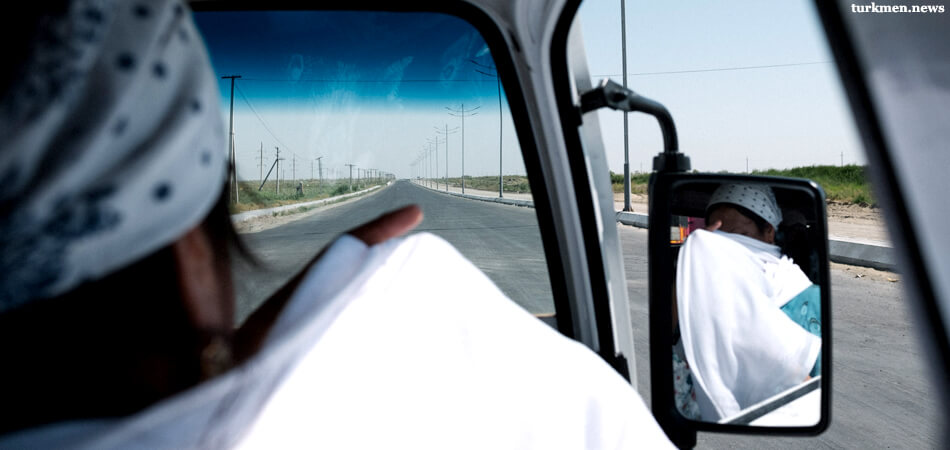
En route to Alat

En route to Alat
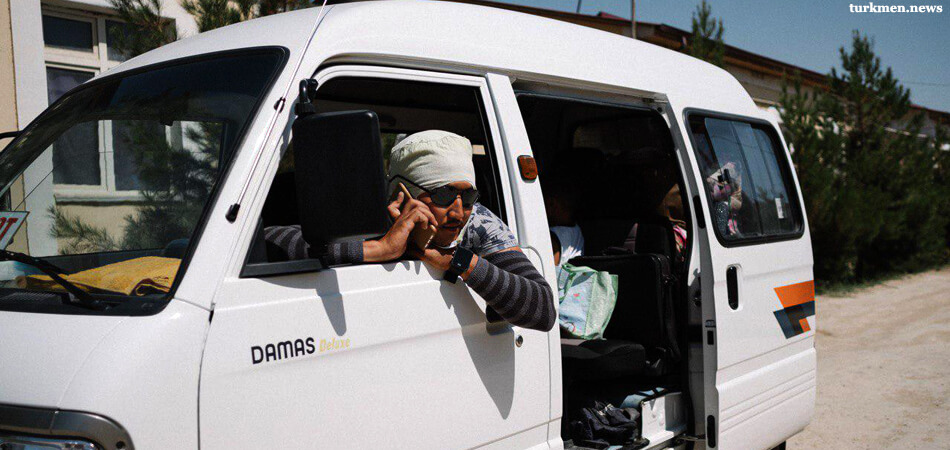
En route to Alat
The minibuses soon fill up with passengers and set off for Alat, one after the other. The woman with the salami manages to hop onto our Damas, her broad smile revealing a full set of gold teeth.
“I told you there wouldn’t be any problems, didn’t I?” she laughs, putting her boxes in the trunk. Some passengers are going to see their relatives, but most, including this woman, are going to the “Turkmen” market in Alat.
It’s said to have acquired its “Turkmen” name not long ago, when people started to bring in goods from Turkmenistan on a large scale. It’s hard to call it a market — women set out their meager goods straight onto the pavement outside the existing market: bottles of shampoo and shower gel, a couple of packs of sanitary towels and wet wipes, several bars of soap and a box of washing powder. Others have towels, scarves, bedcovers and Turkmen embroidery for dresses.
Some items, such as Sha shampoo, Rowach wet wipes and towels are made in Turkmenistan, while the other goods are Iranian, Turkish and Azerbaijani. The police aren’t in too much of a hurry to drive away the illegal traders — they must have some sympathy for them.
Local people love the Turkmen vendors; each woman has only to start setting out her simple wares and she is surrounded by a crowd of potential buyers. Household cleaning materials and toiletries produced in Turkmenistan and Iran are in particular demand.
“Turkmen shampoo is almost half the price of our Uzbek-made equivalent, and the quality is practically the same,” a middle-aged man says. There are high customs tariffs on imported goods in Uzbekistan, so only a small section of society can afford western goods, and there aren’t many people of that category in Alat.
The income from selling these goods just about covers the cost of the visa, but vendors who bring in items on a larger scale, such as our woman with the salami, make a more sizable profit. Many bring in goods piecemeal, which even fit in a small travel bag. The traders say that larger turnover requires well-established connections at customs and regular customers in Uzbekistan.

Turkmen sell piecemeal in Alat, Uzbekistan
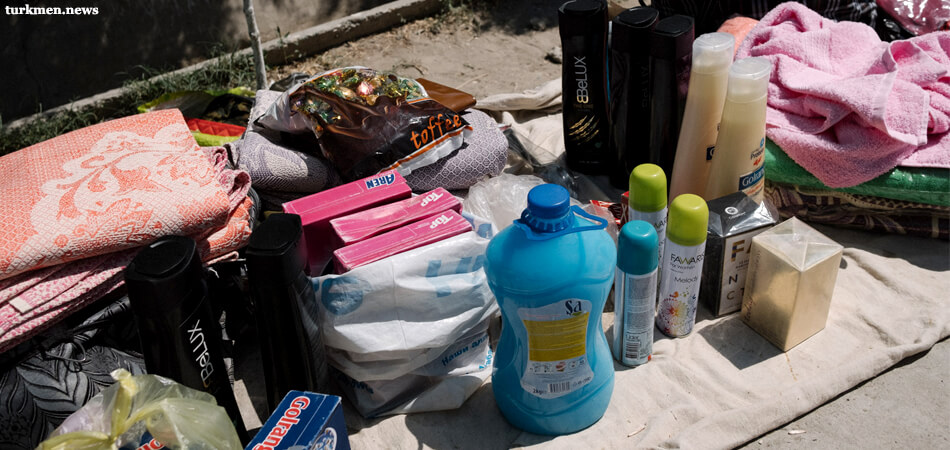
Some of the goods are made in Turkmenistan

Turkmen sell piecemeal in Alat, Uzbekistan

Turkmen sell piecemeal in Alat, Uzbekistan
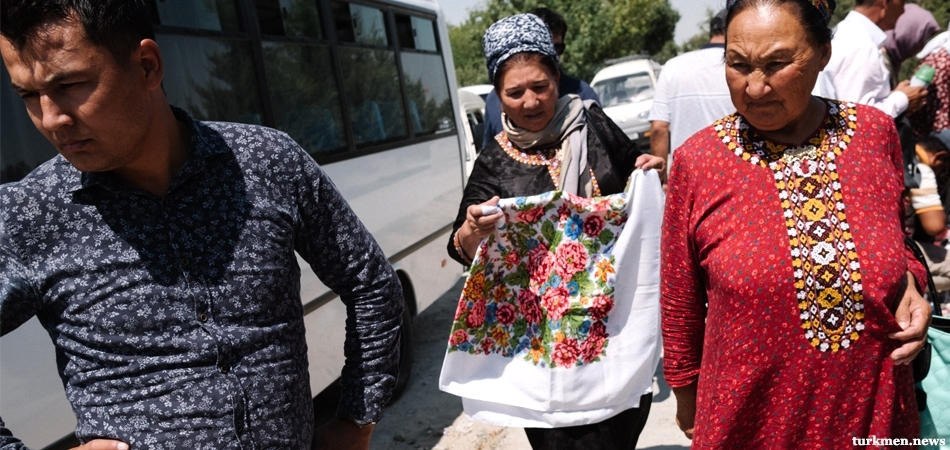
Turkmen in Alat
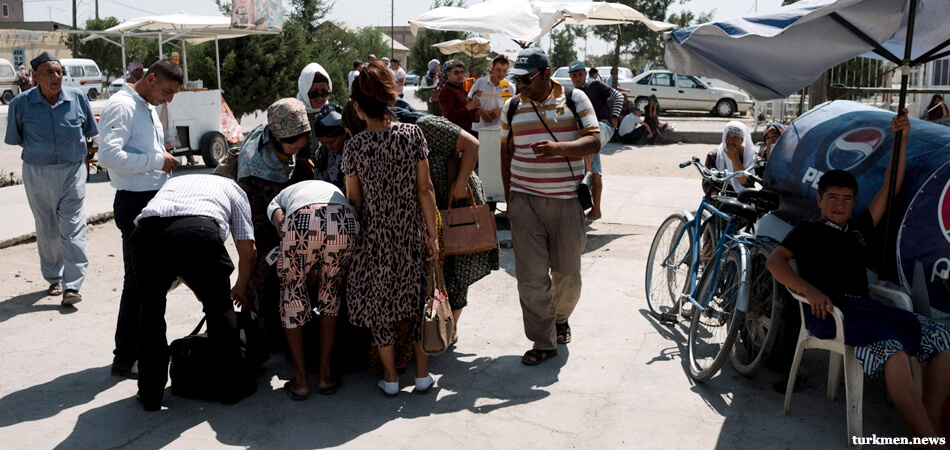
Turkmen sell piecemeal in Alat, Uzbekistan
The main purpose of people’s journeys across the border is to use their bank cards to obtain cash.
Almost all the passengers from Turkmenistan head first for some private houses near the “Turkmen” market. The driver explained that these are the homes of the owners of retail outlets. They each have payment terminals: the Turkmen seemingly make a purchase with their bank cards, but receive hard cash in return. There is a standard cost for the service: for every $50 they spend, the guests from Turkmenistan receive $40 in return. Expensive? Definitely! But even at that price the Turkmen remain in healthy profit.
She will try again the next day, but it’s not certain that it will work — the Turkmen banks are always introducing new restrictions. Some women don’t bring just one card, but several — they withdraw money for neighbors, colleagues and relatives. Not for free, of course.“For that $50, 175 manats were taken from my card at the state exchange rate,” a woman from Turkmenabat explains. “I’ll take $40 home, change them at the bazar according to the market rate, and get 720 manats.”

Turkmen cash their bank cards in private homes
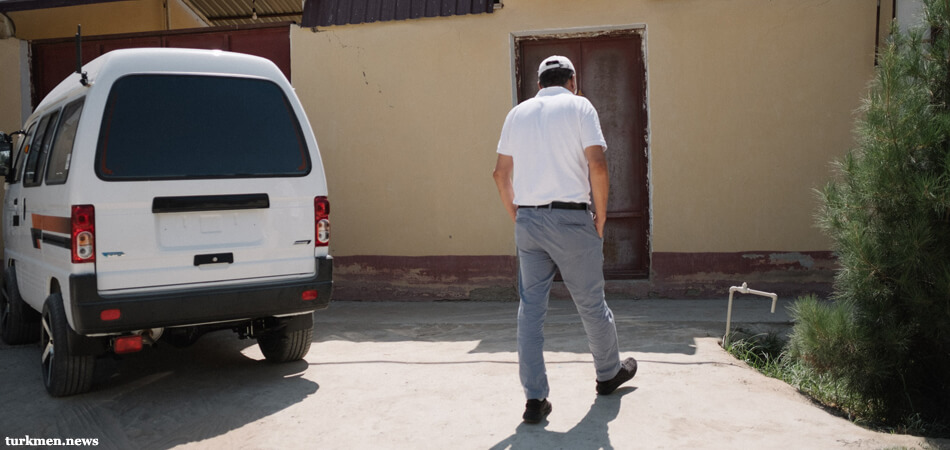
On the return journey all the passengers are sure to buy two packs of cigarettes, which they will sell at four times the price in Turkmenistan. Someone back home will have ordered something for themselves, and the shuttle trader will accordingly take money from them too. In this way, people not only recoup their travel costs to Uzbekistan, but also make a small profit from selling goods, withdrawing hard cash, and reselling cigarettes. Even people who have permanent jobs, seemingly pretty good ones, are involved in this business. They say that life in the “Motherland of Prosperity” is getting more expensive by the day and their wages don’t stretch far enough.“What else can we do? We’re not robbing anyone, are we?” another woman asks, seeing my disapproving expression. “These are the conditions we’ve got and we’re trying to adapt to them.”
P.S. I returned to Turkmenistan without my travelling companions, since they go to Uzbekistan for at least a couple of days and almost every resident of Lebap has relatives there. On the border Turkmen customs officers asked if I had withdrawn money and were amazed to hear I hadn’t. They must have thought they had a stupid woman on their hands. On the plus side, though, I was able to use practically free Internet to my heart’s content.
Source: Turkmen.news
